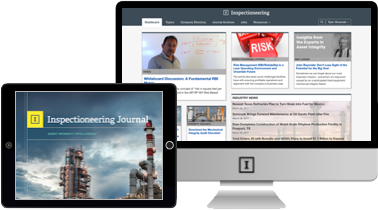Fixed equipment reliability professionals at hydrocarbon facilities around the globe are aware of an industry best practice named RBI (Risk Based Inspection) and the traditional benefits of implementing this best practice. This article intends to use a top-down approach of describing RBI methodology and how it fits in a facility (plant) management system.
The main idea of this article is to provide a comprehensive picture of RBI methodology in terms of basics, technology trends, implementation guidance, and evaluating a potential RBI technology partner.
Introduction to RBI in Hydrocarbon Facilities
The pressure vessel industry has evolved tremendously over the past several decades in terms of design, construction, operation, inspection, maintenance and retirement of pressure vessels. Two of the goals behind this evolution were to make pressure vessels safer and more reliable over their life cycle in a plant. The pressure vessel industry can be split into 3 segments: manufactures, owner/operators, and consultants/service providers. The role of a pressure vessel manufacturer is limited to design, fabrication, and delivery per the latest industry standards (ASME section VIII Div.1, 2 and TEMA, for examples) and / or the owner/purchaser’s specifications. The pressure vessel owner/operators are typically hydrocarbon, chemical, and utility companies, responsible for ensuring safe and reliable operation of these pressure vessels over their life cycles. This is termed, in the traditional sense, as mechanical integrity of a pressure equipment. Pressure vessel consultants/service providers are useful in solving complex engineering and construction issues that require code knowledge, equipment experience, and subject matter expertise of various disciplines to work together.
Pressure vessel owner/operators ensure mechanical integrity of the equipment by having an effective and comprehensive fixed equipment inspection program at the site. In the U.S., OSHA’s Process Safety Management (PSM) standard provides rules and guidance on the mechanical integrity element and various sub-elements. Traditionally, U.S. facilities have used time-based inspection programs per the API 510 pressure vessel inspection code or National Board Inspection Code (NBIC). India, on the other hand, does not mandate any jurisdictional requirements for the inspection frequency of pressure equipment. Recently, the industry has been undergoing a cultural shift from traditional time-based inspection programs to risk-based inspection (RBI) programs. This shift can be attributed mainly to the following three reasons:
- Rise in cost of inspection (internal or external) activities (labor and material) with recent advances in the inspection techniques
- Increase in maintenance budgets resulting from discretionary or opportunistic inspection and maintenance tasks
- Ensure regulatory compliance for extending inspection interval beyond the jurisdictional requirement

















Comments and Discussion
There are no comments yet.
Add a Comment
Please log in or register to participate in comments and discussions.